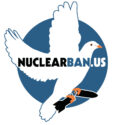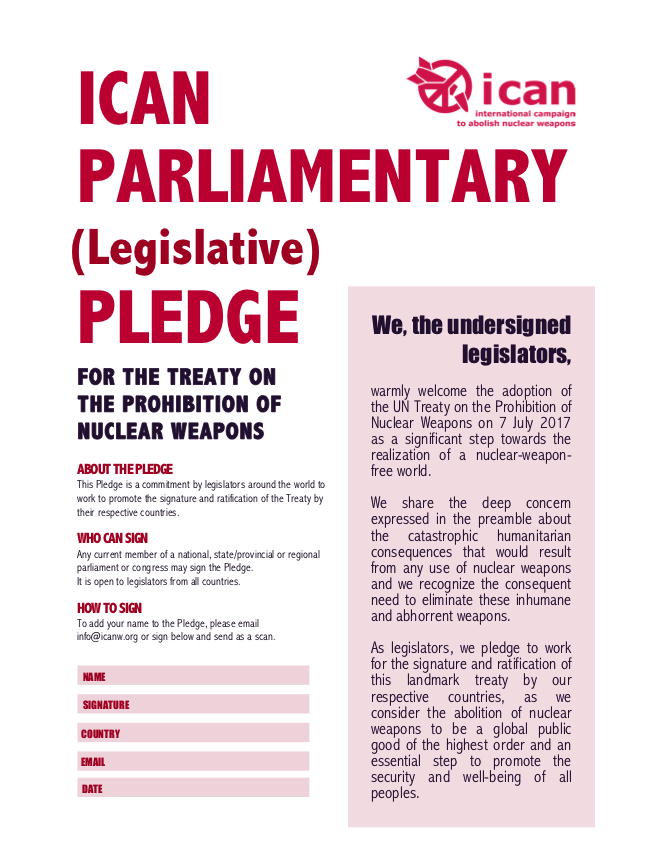The International Campaign to Abolish Nuclear Weapons (ICAN) invites elected officials across the world to demonstrate their support for the Nuclear Ban Treaty by signing the following “pledge:”
More than 1,600 elected officials in 32 countries have signed this pledge, calling for their governments to sign and ratify the Nuclear Ban Treaty, including 11 current members of the US Congress so far:
Carolyn Maloney (NY)
Earl Blumenauer (OR)
Betty McCollum (MN)
We need many more members of Congress to sign this pledge. There are now over 100 members of the Congressional Progressive Caucus. They support the Green New Deal. They support Medicare for All. They support policing reforms, an end to wars in the Middle East, gun control and many other important pieces of legislation. They should all support the Nuclear Ban Treaty!
Click here for a list of our priority targets for signing the ICAN Pledge, or write to your members of congress now and urge them to sign it…
DOWNLOAD THE ICAN PLEDGE (U.S. VERSION) HERE! – and ask your Member of Congress to sign it today
Click anywhere inside the letter below to edit it, adding their name, your name and any other personal touches to the letter. When you are done, SELECT ALL (CTRL+A) and COPY (CTRL+C). Open your email program, click anywhere inside the body of the email and PASTE (CTRL+V) the letter into your email.
Most members of the House of Representatives have an email address of the form:
[email protected]
Most members of the Senate have an email address of the form:
[email protected]
(if those do not work, google your representative and paste your letter into the contact form on their website)
You can now add a subject line and send it!
PASTE INTO YOUR EMAIL APP &SEND TOGETHER WITH A COPY OF THE PLEDGE ATTACHED, AVAILABLE HERE.
AND DON’T FORGET TO INCLUDE YOUR HOME ADDRESS! MOST MEMBERS OF CONGRESS WILL NOT READ YOUR EMAIL UNLESS THAT IS INCLUDED.
Why should they sign it?
(from the back of the printed Pledge form)
Why should Members of Congress sign this pledge?
• The ICAN Parliamentary/Legislative Pledge is a commitment to work for the total elimination of nuclear weapons by all countries, through the universal adoption of the 2017 UN Treaty on the Prohibition of Nuclear Weapons.
• The United States made a legally-binding commitment to eliminate its nuclear weapons more than 50 years ago, when it signed and ratified the Non-Proliferation Treaty (NPT), along with Britain, France, Russia and China.
• In 2000, the United States, together with those same countries, gave to the rest of the world an “unequivocal undertaking” that they would fulfill this commitment to accomplish the total elimination of their nuclear arsenals.
• Despite these commitments, the US continues to develop and ‘modernize’ its nuclear arsenal, with the clear intention of holding onto these weapons indefinitely. This is setting the stage for a much more dangerous world in which every other nation can also decide to claim the same right to develop its own nuclear weapons.
• Unless we get rid of all nuclear weapons, sooner or later, they are going to be used, whether on purpose or by accident. The Treaty on the Prohibition of Nuclear Weapons provides a clear pathway to the verifiable and irreversible elimination of all nuclear weapons by all nations. We must seize this opportunity before it is too late.
• Fifty nations have now ratified the Treaty on the Prohibition of Nuclear Weapons, 34 nations are currently in the process of ratifying, and another 51 nations have so far committed to signing and ratifying it. It enters into force on January 22, 2021.
• This treaty makes it illegal under international law to develop, test, produce, possess, stockpile, transfer, use, or threaten to use nuclear weapons. It also makes it illegal to assist, encourage or induce, in any way, anyone to engage in any activity prohibited by this Treaty.
• More and more countries will continue to sign and ratify this Treaty, including key allies of the United States. Even if the US does not sign the Treaty, it will become increasingly difficult to develop, manufacture, deploy or justify its continued dependence on nuclear weapons.
• Some countries will be interpreting the ‘no assistance’ clause to mean that American companies engaged in the manufacture and development of nuclear weapons will be prohibited from doing business in those countries. Congress should be protecting American jobs by promoting conversion to more globally acceptable activities.
• More than 1,000 parliamentarians in countries not yet on board with the Treaty have signed the ICAN Parliamentary Pledge, including 140 in the UK, 130 in Germany, over 200 in Australia, and nearly 250 in Italy. So far 11 in the US congress and 22 state legislators have signed it.

